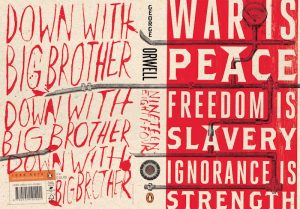
George Orwell’s 1984 thrusts the reader into a world in which both thought and freedom are punishable by death. Chapters one through four introduce Winston, who is well aware that he is being constantly watched and listened to. He must be careful of everything he does, as even the slightest shift in facial expression could give something away. It is made very clear to the reader that Big Brother regulates reality in any way that is beneficial to maintaining the current power structure, whether it be through the routine and schedule of every person in the Party or through what is said in the media.
With that in mind, I found what Winston describes as “Two Minutes Hate” to be one of the more compelling aspects of control demonstrated in this story. During Two Minutes Hate, a traitor by the name of Goldstein is displayed and he talks against Big Brother and the Party’s policies, and everyone gathers to become physically angry towards his thoughts and his image. Initially, I found it odd that they would even distribute his ideals. As Orwell describes:
“But what was strange was that although Goldstein was hated and despised by everybody, although every day and a thousand times a day, on platforms, on the telescreen,in newspapers, in books, his theories were refuted, smashed, ridiculed, held up to the general gaze for the pitiful rubbish that they were—in spite of all this, his influence never seemed to grow less. Always there were fresh dupes waiting to be seduced by him” (17).
Why even consider letting those ideals be shown in the first place? Isn’t that why everything is closely controlled—to have nothing but the Big Brother’s influence and ideals be the only thing allowed? Soon after, we get an answer:
“The horrible thing about the Two Minutes Hate was not that one was obliged to act a part, but, on the contrary, that it was impossible to avoid joining in. Within thirty seconds any pretence was always unnecessary. A hideous ecstasy of fear and vindictiveness, a desire to kill, to torture, to smash faces in with a sledgehammer, seemed to flow through the whole group of people like an electric current, turning one even against one’s will into a grimacing, screaming lunatic. And yet the rage that one felt was an abstract, undirected emotion which could be switched from one object to another like the flame of a blowlamp” (Orwell 19).
The emotions that you are not allowed to express can be directed at something else, and that something just so happens to be representative of freedom and better life. Even though you may secretly not want to, you find yourself raging towards the person embodying the ideals you agree with, which further establishes compliance. This compliance is at such a mass amount that you feel singular in your deeper emotions, and you can only suspect that maybe someone else around you feels the same. Thus those deeper emotions are trained to be pushed down until they disappear or fade away.
There will always be some who do not let this deter their thoughts and emotions, and it seems that Winston is one of those individuals. His need to express thoughts and feelings exceeds even what he is willing to let go of in the Two Minutes Hate. They are dangerous, and the society George Orwell establishes in this story understands that greatly.